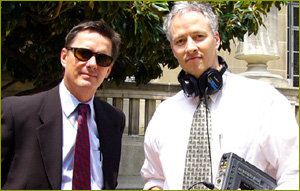Reporter's Notebook
by John Biewen
The proposition: To team up with a print journalist and make radio out of his reporting on surveillance technologies, national security and privacy. Robert O'Harrow was still very much in the middle of his own explorations, so I joined him on a sort of quest to understand some major but little understood changes in our country after the September 11 terror attacks. The result: A fascinating journey inside the nation's new surveillance society. Along the way, the two of us discovered and rediscovered a shared set of questions and conclusions.
 | Robert O'Harrow, Jr. and John Biewen | |
Bob O'Harrow is a distinguished Washington Post Reporter on a year's leave to write his book, No Place to Hide. The Center for Investigative Reporting brought Bob together with ARW to make a companion radio documentary. My own dawning understanding of the world Bob was exploring makes a pretty good metaphor for the topic itself. From a thousand dizzying and seemingly disconnected data points, a rather simple but disturbing picture eventually emerged.
Bob began educating me about data companies I'd never heard of - companies with forgettable names like ChoicePoint, Acxiom, and Seisint. We explored the world of biometrics: face-recognition and electronic fingerprinting, and efforts to identify you and me from the mass of humanity by our unique ways of walking. I read Bob's draft chapters about the credit bureaus and identity theft, and also about the swift passage of the Patriot Act after 9/11. I gradually learned to distinguish among the various colorful geniuses who'd invented these technologies and headed these shadowy companies.
For a time I was lost among the trees. But as we talked after long days of reporting, we tried ways of telling a simpler story, of capturing the larger meaning in all this information, the many amazing changes taking place. As a mental exercise, one day in early 2004 I sat down and dashed off a note to myself in the form of a hypothetical scenario:
What if, a few years ago, the president had given a major address to the nation and said:
We face grave threats from abroad, and at home. Millions of people around the world hate America and want to destroy us. Without doubt, some of those people are living on our soil.
To respond to this threat, I've asked Congress to create a new Department of Surveillance. Employing tens of thousands of workers across the country, this new department will gather information on all Americans and all foreigners living in America. It will monitor many of your movements and purchases, your medical records, your associations, your reading and travel habits, and much more. The Department will create powerful computer programs that will allow authorities to find patterns in the behavior of each and every American, so we may identify those among us who behave suspiciously and require greater scrutiny.
I pledge that by 2005, law enforcement officials anywhere in America will be able to enter your name into a computer, and in seconds receive a detailed dossier on you. This data will also be used to rate the likelihood that any person living in America will commit crimes or acts of terrorism. (Most of the data gathered by the Surveillance Department will also be available to businesses and members of the public at a reasonable charge.)
The aim is simple: personal and national security. Our surveillance society will be a safer society.
Would Americans have consented? Even after 9/11, would we consciously agree to have our heretofore-private information gathered and shared in this way if the choice were presented to us plainly?
The above speech was never given, of course. But as I came to understand during my journalistic quest with Bob, the society described by this imaginary president is rapidly coming to pass. The stand-in for the Surveillance Department? Companies like ChoicePoint, Acxiom, Seisint, and Lexis-Nexis working closely with the FBI, NSA, CIA and other national security and law enforcement agencies. Most of these companies don't make much effort to tell the world exactly what they do. And because they are not government agencies, they're largely unaccountable to the public. So far, a full-fledged national debate that would have followed such a presidential address has not happened. The surveillance society is becoming a matter of fact without most Americans understanding it or having any say in the matter.
The threat of terrorism is real. It would be too simple and even foolish to simply ban the use of information technologies by law enforcement and national security agencies. But we need a vigorous debate about where to draw the lines, one that addresses the potential costs of these changes. How do we prevent wrongful monitoring and mistaken prosecutions based on the use of data-mining tools? Who's accountable?
The majority of us (perhaps those of us, for example, without Muslim-sounding names) aren't likely to have an FBI agent show up at our door. Still, we all have a stake in the debate. To quote Robert O'Harrow from No Place to Hide, the book:
"Surveillance comes with a price. It dulls the edge of public debate, imposes a sense of conformity and introduces the uneasy feeling of being watched. It chills culture and stifles dissent. ... The new legal authorities and the government's partnership with private information companies now pose a direct threat to this three-decade-old effort toward openness. ... Their capabilities have raced far ahead of the nation's understanding and laws. The legacy of these efforts will be with us for many years."
Back to No Place to Hide
|



